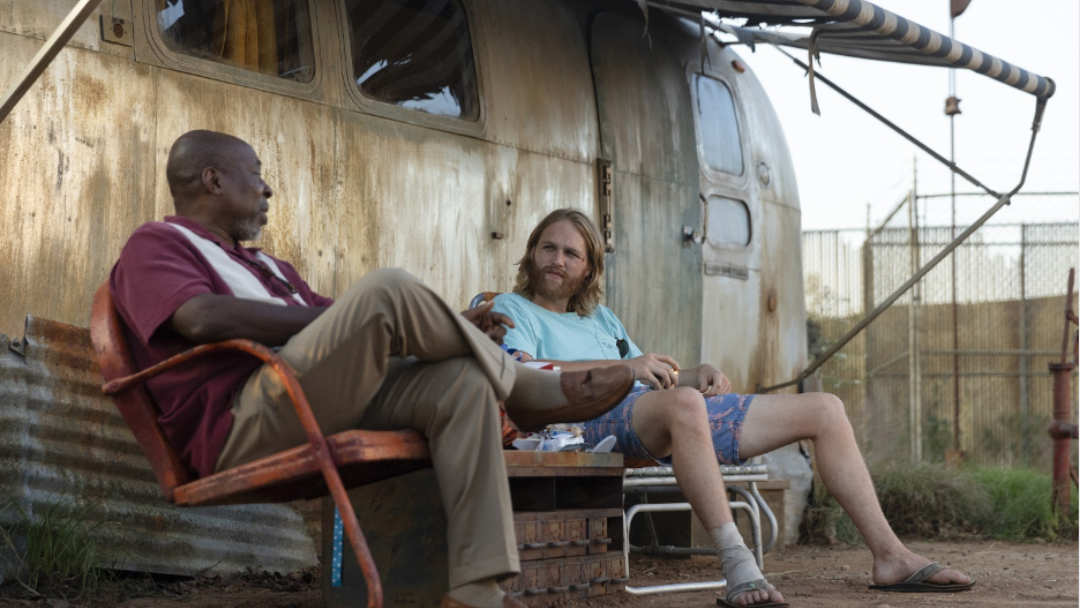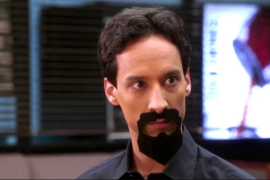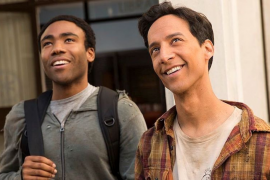“What is it about the light on Sundays? It’s brighter but more empty.”
“Sundays are haunted.”
THE PAST FOUR YEARS HAVE BEEN A GAUNTLET OF BAD NEWS, every fresh horror delivered straight to us by the power of the internet. This past year alone has had a decade-worth of historic events packed in, but the cruelest twist has been that for many of us, we have had to bear much of this without our usual support systems of people and comforting locations. Hanging out in a Zoom conference call with your friends just doesn’t have the same weight as gathering at your favorite bar. With everything seemingly terrible all the time, it can’t help but feel as though some unseen dam has cracked and darkened waters have seeped out into the world, as though the laws that used to dictate a normal reality have abandoned us. It’s easier than ever to feel isolated, but as with all times of great demand, now more than ever, moments of friendship feel like they’re worth their weight in gold.
Magic realism has found a home on the small screen in recent years. AMC’s unfortunately short-lived Lodge 49 (2018-2019) makes its home in the same ballpark as Twin Peaks, The Leftovers, and Atlanta but while those shows exist somewhere in the shadowed tunnels of the stadium, Lodge 49 is relaxing in the cheap seats, wearing a favorite psychedelic band t-shirt. Lodge 49 shares similarities with the other shows (the mysterious places of gathering from Twin Peaks, the economic anxiety of Atlanta), but is mostly interested in the lives of everyday people caught between magical possibilities and a mundane sunbaked SoCal. Signs and symbols abound, secret tunnels lead to and from unexpected locations, and there may or may not be a unicorn lurking around town. Characters go on quests for alchemical formulas and secret scrolls but spend most of their time worrying about balancing debt and rent.
The show explores the lives connected through and orbiting the fictional fraternal order of the Lynx, within the titular Lodge 49, but its focus is the connection between Sean “Dud” Dudley (Wyatt Russell) and Ernie “Ern” Fontaine (Brent Jennings). When chance leads him to becoming a member of the lodge, Dud quickly latches onto the older man as a father figure and the two assume a quasi-knight and squire relationship. It’s uneasy at first, Dud’s endless sense of optimism chafing against Ern’s world weariness, but it’s not just the mysteries of the lodge that keep the men close. Both have been marked by tragedy. Dud is an orphan and Ern lost a child during a failed marriage. They both live paycheck-to-paycheck with frequent visits to the local vulture of a pawnbroker. So whenever a chance for wealth comes up (oil wells, alchemical gold, Bitcoin, just to name a few opportunities), the pair find themselves chasing paths that mostly lead to nothing but shadows and missed connections. Their hustles never feel malicious, never veering close to the comedic edge of something like It’s Always Sunny in Philadelphia. Instead Lodge 49’s plans are done by people left desperate from the perpetual weight of late stage capitalism. But often these plans, with all their chances for a better life, are put on hold in order to help one another.
In the first season’s episode “Sunday,” Ern and Dud set about trying to find the aging Sovereign Protector (the Lynx’s fancy title for club president), Larry Loomis, who has gone missing. Their search takes them across town, to dead ends, car maintenance mishaps, and even brief kidnappings by shady real estate developers. Along the way, the two start to get to know each other. This is their first extended amount of time together. The conversation is awkward at first but eventually it falls into the rhythm of old friends as they putter around town in Dud’s decrepit Volkswagen Thing. The pair finally reach Larry’s place of residence, an old trailer hidden from sight by a tall fence and just a stone’s throw from the lodge. Larry isn’t there, so the two make themselves at home. Seating themselves in front of the trailer, they kick back in the late afternoon light and crack open some beers. It’s not long before the men start musing on their day.
“Why would anyone want to live forever?” Ernie asks, inspired by the recent find of a mummified body hidden away in the lodge, a previous Sovereign Protector who had unsuccessfully attempted to achieve immortality through alchemical means. “I just want to live for real, for a little while, right here. People always go looking for unicorns when we’ve got rhinos right here.” Dud chuckles at the sentiment but Ernie is serious. “The rhinoceros is a fascinating animal,” he continues. “All this beautiful stuff, right here in front of us. Screw unicorns, man. What’s the use of living forever if you’re all alone on a Sunday?”
The two men sit together in silence, drinking their beers. It’s a moment captured from time, done so by recognition of its significance. Calling attention to a moment of quiet peace and comradery crystalizes its importance, an act of mental alchemy. It brings to mind a quote often misattributed to Kurt Vonnegut: “I urge you to please notice when you are happy, and exclaim or murmur or think at some point, ‘If this isn’t nice, I don’t know what is.’” Wise words to live by from Vonnegut’s uncle but hard to put into habit, especially when such moments are so fleeting againstthe march of time and bad news. The rhino is still endangered, there’s an end to every can of beer, and Sunday always melts away to reveal a new Monday. Snapshots of moments like Sunday afternoon beers with friends are a reprieve from mundanity or worse and the catalyst is often each other. Learning to recognize the beauty of moments, especially in the company of others, is a repeating theme throughout the show, mirrored across time and places.
Near the end of Season 2, in the penultimate episode “Le Reve Impossible,” the core cast of characters find themselves in Guadalajara on the trail of a mysterious set of scrolls that have been hinted at since early in Season 1. At a resort hotel, Dud finds himself among everyone he loves and as he looks out over the group, he takes in the moment and you can visibly see his heart swell. When asked if he’s alright, Dud’s voice cracks as he replies, “We’re all here.” The moment is larger in scale than it was on “Sunday,” but its core remains the same. It’s people that bring value to our time. Sure, there’s nothing wrong with quiet moments of individual contentment or achievement and this is a show that also celebrates that. Comparing the two is like trying to compare solo performances against full symphonies. Both have their own merits, but Lodge 49 is interested in making sure everyone is welcome and important in its orchestra. All the main characters are encouraged to find respite from the grind with each other, to help carry each other’s burdens.
Lodge 49 is a show of hard-won optimism, never becoming cloyingly sentimental in its approach. In the unintentional series finale, as Ern is about to be crowned rightful Sovereign Protector of Lodge 49 and Dud to be appointed his knight, the pair share a brief conversation before the ceremony and Dud reveals the cost of his optimism. “On some days, all the beautiful things in my life break my heart. Will it always feel this way?” he asks, his eyes full of tears. He knows that the good moments, of friendship and shelter, are often all too temporary. Dud is a survivor, of bad luck, financial hardships, personal health issues, and grief. Through it all, he fights for a sense of hope that things can get better. He fights in his own way like a drowning man trying to make it to solid ground, which turns out to be the people within Lodge 49. Together, they form a tribe making their own state of peace. It just took them all a while, just like many of us. The triumphs of the characters of Lodge 49 feel like personal triumphs.
Lodge 49’s unceremonious cancellation, in keeping with the mood of 2020, left quite a few threads dangling lose. We are denied answers to many of the open mysteries as well as to the general fate for this cast of characters. I’m a big proponent for shows to end young and on a high note versus running itself into the ground but it’s hard to see a good show let go before it can complete the story that it wants to tell. Even harder if you’ve grown attached to the characters. The struggles and successes of Dud, Ern, and their friends and family hit very close to home for me. Myself and my generation are marked by economic anxiety. As I write this, over 7,000 people have died in my state alone from a pandemic that has changed the state of the world forever. Every day I wonder if my job is going to keep my contract position. It feels like we are all living in the shadow of something that was once grand but never meant for us, just as the inhabitants of Lodge 49 move like hermit crabs into the abandoned shells of corporate properties. We are surrounded by mysteries we will never know the answers to. Granted the mysteries may not involve secretive fraternal orders, but they can be just as obtuse and heartbreaking. That’s what makes moments like beers with friends so valuable, even in the haunted light of a Sunday afternoon. In the moment among friends, if that isn’t nice, then what is.
An MFA graduate from Oklahoma State University, WYETH LESLIE (he/him) is a poet and author interested in pop culture, technology, and beauty in the mundane. His writings have been featured in publications such as The Vital Sparks, Lost Futures, The Daily Drunk, and Haywire Magazine. He can be found staring into the abyss on Twitter: @Wyeth_was_here
Like what you’re reading?
Get new stories or poetry sent to your inbox. Drop your email below to start >>>
OR grab a print issue
Stories, poems and essays in a beautifully designed magazine you can hold in your hands.
GO TO ISSUESNEW book release
China Blue by Catherine Gammon. Order the book of which William Lychack Jeffries calls “a fiery declaration of all that is inexpressible about desire and loss and the need to find a home in a world in which even the most solid and real of things feel often less than completely solid or real.”
GET THE BOOK



